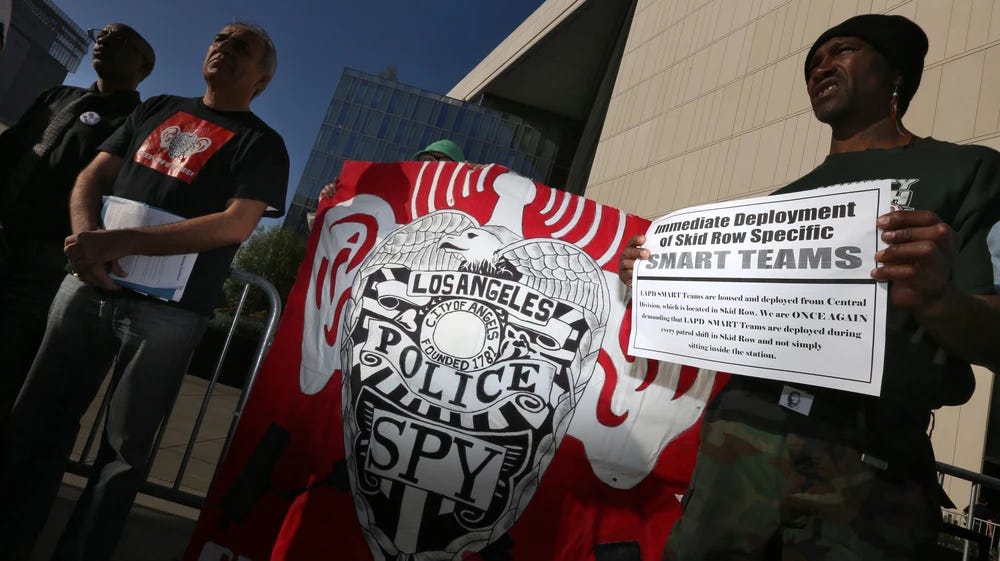Abolish Police Surveillance, TransUnion v. Ramirez, And 150,000 Cameras Hacked
Whose Streets? Our Streets! (Tech Edition) Issue 17
T👁️p 3 St👁️ries 👁️f the Week
Watching the Watchers: Police Surveillance Can't Be Reformed. It Must Be Abolished
“The expanding use of surveillance technology is a fundamental component of police violence against Black communities. Across the country, police use technology ranging from drones and facial recognition to predictive analytics to keep marginalized communities under constant watch and control. But even after months of street protests condemning police violence, some advocates seek dangerous compromises that allow this violent institution to expand its power—promoting toothless regulations instead of dismantling and defunding policing as a whole.” [VICE via JTDL]
Policy: EFF to Supreme Court: Users Must Be Able to Hold Tech Companies Accountable in Lawsuits When Their Data is Mishandled
“The Electronic Frontier Foundation (EFF) today urged the Supreme Court to rule that consumers can take big tech companies like Facebook and Google to court, including in class action lawsuits, to hold them accountable for privacy and other user data-related violations, regardless of whether they can show they suffered identical harms.” [EFF, see also EPIC’s amicus brief]
City: Hackers access security cameras inside Cloudflare, jails, and hospitals
“Hackers say they broke into the network of Silicon Valley startup Verkada and gained access to live video feeds from more than 150,000 surveillance cameras the company manages for Cloudflare, Tesla, and a host of other organizations. The group published videos and images they said were taken from offices, warehouses, and factories of those companies as well as from jail cells, psychiatric wards, banks, and schools.” [Ars Technica, see also ACLU]
City Watch
Belarus – Used by Repressive Governments, Belarusian Facial Recognition Software Tracks Dissidents [Kharon]
Greece – Greek police roll out new ‘smart’ devices that recognize faces and fingerprints [PRI]
Iowa, U.S. – Iowa Air Guard Unit Involved In Overseas Drone Strikes Is Buying Location Data From Data Brokers [Techdirt]
New Zealand – Police dodge questions about facial recognition technology used to photograph youth [Newshub]
Portland, OR, U.S. – Portland, Replica Part Ways Over Data Privacy Concerns [Government Technology]
San Francisco, CA, U.S. – Facial Recognition Ban May Have Saved San Francisco from Hack [Government Technology]
Various U.S. Cities – As smart city technology advances, community groups warn of privacy concerns [The Denver Channel]
Various U.S. Cities - Stimulus Package Means Billions for State and Local Tech [Government Technology, see also Stacey on IoT]
Virginia Beach, CA, U.S. – Virginia Beach police admit officers tried a controversial facial recognition program [The Virginian-Pilot]
Zimbabwe – Concern over acquisition and use of surveillance tools in Zimbabwe [MISA Zimbabwe]
Market Watch
Acquisitions & Financing
Mobility: Micromobility Data Startup Populus Raises $5M from Investors [Government Technology]
Other:
Government Procurement Startup Marketplace.city Raises $1M [Government Technology]
“KORE Wireless Group, an Atlanta, Ga.-based Internet of Things solutions company, agreed to go public via merger with Cerberus Telecom Acquisition, a SPAC associated with Cerberus Capital Management. A deal would value the combined firm at $1 billion.” [Fortune Term Sheet]
Legal
Biometrics: Facial recognition company Clearview AI, which is used by law enforcement around the US, is sued over its dataset [LA Times, see also Wall Street Journal]
Patents/New Tech
Biometrics: Amazon expands its palm recognition payment tech to more of its stores [The Verge]
Mobility:
Google Maps introduces a way for users to add and edit roads (again) [Ars Technica]
Uber and Lyft will share information about drivers deactivated for serious offenses [The Verge]
Video: Facebook’s next big AI project is training its machines on users’ public videos [The Verge]
Other:
Ann Arbor tech startup reimagines keyless home entry and smart access [A4]
Beyond anonymization (Palantir Explained, #3) [Palantir Blog]
Public Private Partnerships
Other: Seattle and Portland: Say No to Public-Private Surveillance Networks [EFF]
Purchasing Trends
Policy Watch
Canada (Update) – Privacy commissioners take position on using facial recognition technology [Data Protection Report]
Nebraska, U.S. (Update) – Proposed bill could ban the use of facial recognition technology in Nebraska [ABC 8]
New York, U.S. – Ban ‘digital stop-and-frisk’: Facial recognition technology too prone to errors [NY Daily News]
New Zealand (Update) – Facial recognition used on photos of unidentified suspects only – Coster [Stuff]
U.S. Federal (Update) – CDT Joins Coalition Letter to Secretary Mayorkas on Proposed Expansion of Facial Recognition at Airports [Center for Democracy and Technology, see also EPIC and CDT’s supplemental comment]
U.S. Federal – What’s New in Civic Tech: $948B Digital Equity Bill Arrives [Government Technology, see also EFF]
Various U.S. Cities – America grapples with regulating surveillance technology [The Economist via JTDL]
Various U.S. Cities – Judge blocks US restrictions against Chinese smartphone maker Xiaomi [The Verge]
Various U.S. Cities – Recent Decisions in Illinois Limit BIPA’s Reach, but California Begs to Differ [JD Supra]
Watching the Watchers Watch
Various EU Cities – Independent panel to advise police on use of emerging technology [Stuff]
Wisconsin, U.S. – EFF, ACLU and EPIC File Amicus Brief Challenging Warrantless Cell Phone Search, Retention, and Subsequent Search [EFF, see also EPIC]
Bonus Section…A Policy Measurement to Watch
📏: A Simple Way to Measure Whether Your Privacy Law Is Worth a Damn [OneZero]
Whose Streets? Our Streets! (Tech Edition) documents trends in the surveillance of public space. Curated by Rebecca Williams and Madeleine Smith as part of smart city surveillance research for the Technology and Public Purpose Project at Harvard Kennedy School's Belfer Center.







